|
November 20, 2019
Over 3,000 Canadian National Railway Workers On Strike
All Out to Support the Just Demands
of CN Rail Workers!
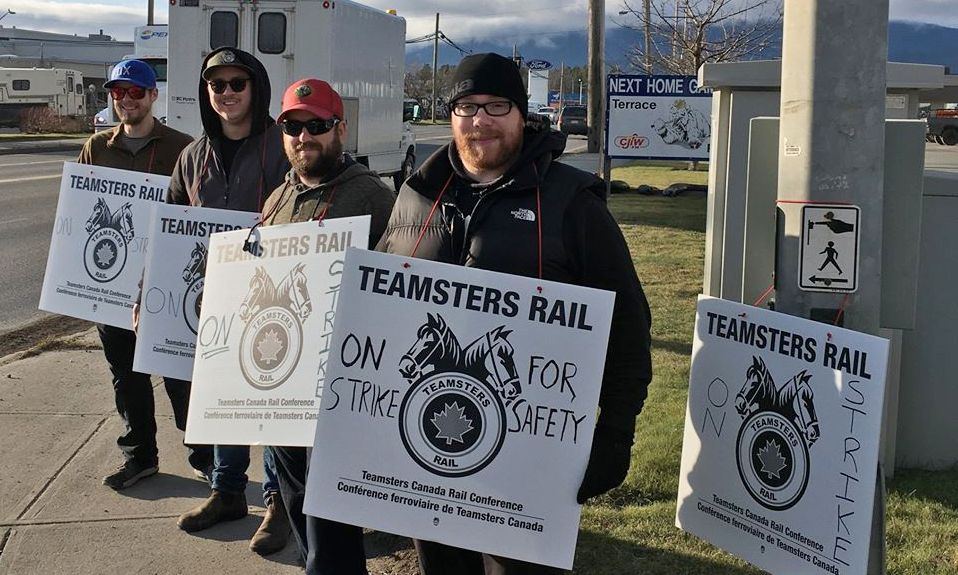
Terrace, BC, November 19, 2019.
Glencore Empire Announces Closure of Belledune Lead Smelter
in New Brunswick
• Manufacturing Yes! Nation-Wrecking No!
• An Act Meant to Intimidate the Working Class
• Decision to Close Smelter Should Not Be in the Hands of Global
Private Interests
• Reaction of Local Officials and Politicians
• Glencore Global Cartel
Over 3,000 Canadian National Railway Workers On Strike
 
Picket lines in Port Robinson (left) and Prince George.
At 12:01 am Eastern Standard Time on November 19, about
3,200 Canadian National Railway conductors, trainpersons and yard
workers went on strike, mainly over issues of workers' health and
safety, which are also issues of public health and safety. The workers
are members of the Teamsters Canada Rail Conference (TCRC), which
served the legally required 72-hour strike notice during the evening of
November 15. The TCRC reports that it was unable to reach a deal with
CN, as the company remains unwilling to address the workers' concerns.
The labour contract of these workers expired on July 23.
The monopoly media are reporting that talks are ongoing with CN at this
time.

Picket line goes up in Saskatoon, as strike begins on November 19, 2019.
In a press release dated November 16, the TCRC explained:
"CN currently requires TCRC members to operate trains
alone from outside of the locomotive, hanging on to moving trains with
one hand while operating a remotely controlled locomotive with the
other. Railroaders are expected to do this in rain and in freezing
temperatures, sometimes for distances of up to about 17 miles.
"The union's demands to cease these dangerous practices
have fallen on deaf ears and the company has refused to come to a
satisfactory agreement at the negotiations table to adjust their
operating practices in the interest of safety.
"The company also wants to make it more difficult to
take time off and make employees work longer hours, in an attempt to
get more work done with fewer people and to reduce staffing levels.
"'Fatigue has been recognized by the Transportation
Safety Board as a major safety problem in this industry. Too many
railroaders are operating trains when they should be resting,'
explained the president of the TCRC, Lyndon Isaak. 'For the safety of
all Canadians, we cannot allow CN to make it even harder for our
members to get the rest
they need.'
"Moreover, CN is demanding that the union accept a
lifetime cap on prescription drug coverage which would be tantamount to
denying workers -- and their families -- proper treatment for some
forms of cancer, rheumatoid arthritis, diabetes, and other diseases.
"Wages are not a major sticking point in these negotiations."
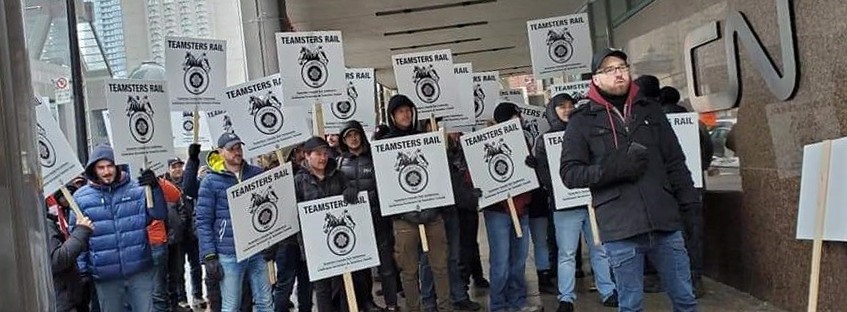
Montreal, November 19, 2019.
These are long-standing concerns of the rail workers,
for which they have been presenting demands that remain unaddressed by
the rail monopolies and the federal government.
Already, the monopoly media are playing their dirty role
of paving the way for the Trudeau government to pass back-to-work
legislation so that the just struggle of the workers is criminalized
and the burning issues they are raising are once again swept under the
rug, while workers and the public are placed at great risk. Just 12
hours after the CN workers went on strike, the Kenney government in
Alberta called on Prime Minister Justin Trudeau to immediately recall
Parliament and enact back-to-work legislation (Parliament is not
scheduled to convene until December 5). In calling for the
criminalization of the striking workers and the important issues they
are raising, the Kenney government shamefully invoked the failure to
build pipelines, saying this puts extra pressure on CN to transport oil
by rail, and also claimed to be defending farmers, saying they need to
transport their crops and are already facing problems with bad weather
and the trade dispute with China.
This must not be permitted to happen. All workers and
the public at large must express their support for the just demand of
the CN workers for a negotiated contract that addresses their concerns
and demands.
Halifax

Thunder Bay

Winnipeg
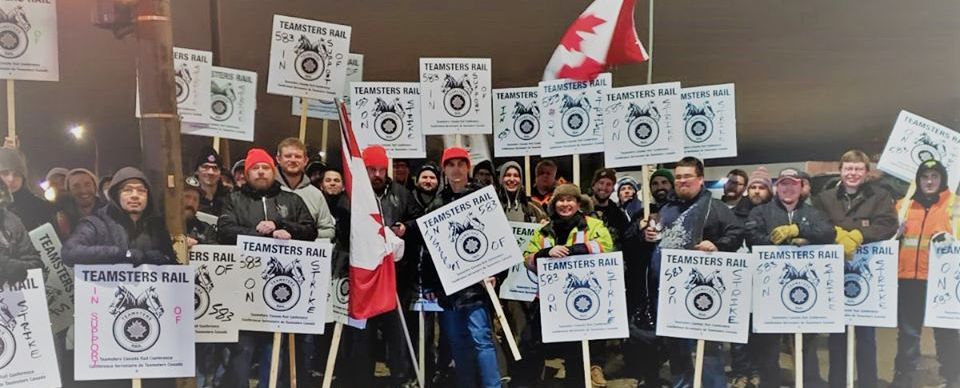
Calgary

Edmonton
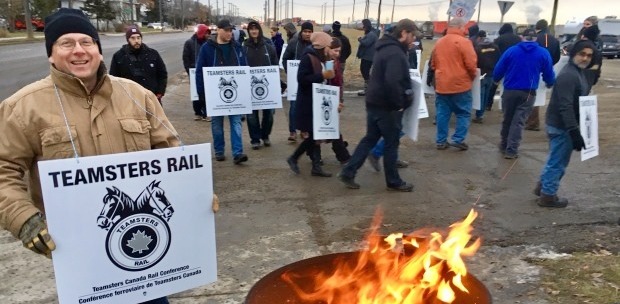

Glencore Empire Announces Closure of Belledune Lead Smelter
in New Brunswick

Locked-out workers from Belledune picket Glencore properties in Montreal November 13, 2019.
The Glencore global empire in a surprise attack issued
a statement on November 13 announcing the permanent closure of the
Belledune Lead Smelter plant it controls. The 420 workers at the
smelter, local townspeople, officials and politicians were not
consulted and received the news with utter shock. No discussion of the
shutdown occurred
in advance while in fact many in the region believed that the recent
investment in an acid plant at the smelter signalled a continuation of
production for the foreseeable future.
 Two-hundred
and eighty members of USW Local 7085 have been locked out of the
Belledune Smelter since April 24. They were in Montreal picketing
Glencore properties to explain their situation to fellow workers when
they received the news. Glencore has been demanding concessions from
them that would weaken the workers' health and safety regime at the
plant. Two-hundred
and eighty members of USW Local 7085 have been locked out of the
Belledune Smelter since April 24. They were in Montreal picketing
Glencore properties to explain their situation to fellow workers when
they received the news. Glencore has been demanding concessions from
them that would weaken the workers' health and safety regime at the
plant.
Needless to say, the news of the shutdown was like a
dagger to the heart of all concerned, as the small community of 1,400
in northern New Brunswick has very little other employment. The loss of
associated work and direct reproduced-value with the final closure at
the end of the year will be a great blow to the town and region.
The area has suffered two major shutdowns in recent
years. Xstrata, which is now part of the Glencore Empire, closed its
nearby lead/zinc Brunswick Mine in 2013 resulting in a loss of over 900
jobs. Prior to that in 2005, the Smurfit-Stone corrugated paper mill in
neighbouring Bathurst shut down with a loss of almost 500 jobs. Workers
at those two sites and the Belledune smelter have produced enormous
quantities of added-value over the years, most of which has not been
invested in the region but rather seized and removed by the global
financial oligarchy as private profit, leaving the local economy
extremely weak.
Working people in New Brunswick and across Canada are
commenting that these actions, which put the private interests of the
international financial oligarchy ahead of all other considerations and
turn the lives of people upside down, are no way to run a modern
economy. These workplaces are the economic foundation of a community
and its
people and future. Decisions about the economy and its extended
reproduction, diversity and stability are everyone's concern and it is their right
to have a say and to chart a course forward. A new direction for the
economy is necessary and the organized working people and their allies
must bring it into being.

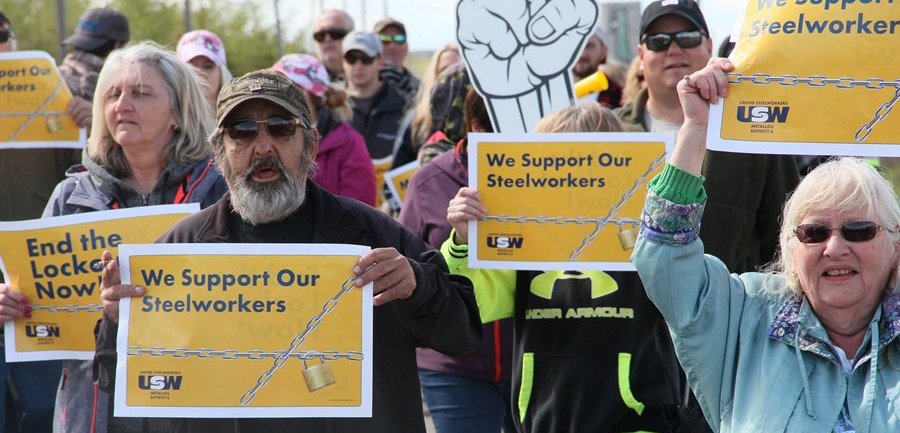
Community rally June 4, 2019, supports the locked-out workers at the Belledune smelter.
The 280 members of United Steelworkers Local 7085 have
been locked out of their Belledune smelter since April 24. The Glencore
cartel locked out the workers to force them to accept concessions on
health and safety and other issues. Local 7085 led by its President
Bart Dempsey has waged a determined struggle against the giant global
company. The locked
out workers have gained respect and support from Canadians for their
just stand in defence of their rights. In fact, members of Local 7085
were in Montreal reaching out to fellow workers at three Glencore
facilities the morning of the announced shutdown.
Many believe the sudden closure of the plant is meant to
intimidate Glencore workers at all its facilities and dissuade them and
others from organizing struggles in defence of their rights. The
intimidation comes at a time workers across Canada are finding new ways
to deal with the power and vast social wealth of global giants such as
Glencore.
ABI aluminum smelter workers in Bécancour, Quebec
put up a determined two-year fight under conditions of a brutal lockout
to reach terms of employment they could accept. USW Local 9700 at the
smelter took their members' fight against the financial oligarchy to
workers throughout the world. The United Steelworkers National Policy
Conference held in Vancouver last April announced a worldwide campaign
against the Alcoa/Rio Tinto lockout of the Bécancour workers.
The global campaign focused on exposing the anti-worker practices of
Alcoa, which owns 75 per cent of ABI, and the anti-worker comments of
the Quebec government and its collusion in allowing the cartel to
avoid paying for its contracted electricity during the lockout.[1]
Similarly, Belledune workers were gaining strength and
support during the lockout for their just stand in defence of their
rights. Many believe that the Glencore oligarchs are terrified to see
the Belledune workers' spirit of resistance spread throughout their
empire and want to destroy it at the source, as an example to others
not to defend their
rights. As can be seen around the world, the imperialists destroy
through anarchy and violence what they cannot control. This must be
stopped!
Note
1. "Steelworkers Launch Global Campaign to Force Alcoa to Negotiate a Collective Agreement Acceptable to the Workers," Workers' Forum, April 11, 2019

Glencore said the lockout and its dispute with workers
are "unrelated to the permanent closure" of the smelter. It said this
despite the fact that the cartel planned to invest $65 million in the
smelter and had already spent $20 million to build a new acid plant.
 Without
prior discussion or providing any proof, Glencore cited poor business
results and financial forecasts as reasons for the shutdown. This
method is very convenient because the cartel believes the power of
property ownership and the control this entails allows the oligarchs to
say and do whatever they want, including what to do with the
added-value workers have produced over the years; whether to invest
that value in the plant and community or not, and whether to continue
production at the smelter or destroy it. Without
prior discussion or providing any proof, Glencore cited poor business
results and financial forecasts as reasons for the shutdown. This
method is very convenient because the cartel believes the power of
property ownership and the control this entails allows the oligarchs to
say and do whatever they want, including what to do with the
added-value workers have produced over the years; whether to invest
that value in the plant and community or not, and whether to continue
production at the smelter or destroy it.
The imperialist right of global private interests to
decide denies workers and community members and officials any say in
decisions concerning the socialized economy. It deprives them of the
modern right to agree or not to agree to such important decisions as
where to invest the added-value workers produce, and whether or not to
destroy a
productive facility. This must change!
Without providing any verifiable evidence, Glencore
spokesperson Alexis Segal told CBC News, "We need to be very clear that
the plant was not making money for the last three years. In fact, the
plant lost in average over the last three years $30 million per year.
And after this last budget cycle it was evident that things would not
be
improved in the coming years either."
Glencore Zinc & Lead Assets head Chris Eskdale said:
"The decision to cease lead smelting operations at our Brunswick
Smelter was a very difficult one. Despite years of efforts by committed
employees and a strong management team, the smelter has been uneconomic
since the closure of the Brunswick Mine in 2013.
"We have thoroughly assessed all our options and come to
the unavoidable conclusion that the smelter is simply not sustainable,
regardless of the recent labour dispute."
"Uneconomic since 2013!" What nonsense! This begs the
question why Glencore as recently as this year planned to develop the
smelter and continue its transition to a custom smelter with an
investment of $64 million in an acid plant. The first phase, worth
about $20 million, has already been completed. Both the investment and
the shutdown
remain company secrets, with workers and others most closely affected
left in the dark without a voice.
Glencore officials trotted out the usual explanation of
increased international competition, particularly from several new lead
smelters in China. This flies in the face of nation-building and the
development of a self-reliant diverse economy that does not base itself
on competing in the world. Such an economy invests in its people and
extended
reproduction and diversity of the economy adding strength to the
overall economy through building up the collective efforts of all its
regions and sectors through planning and increased investments in
manufacturing, refining natural resources, expanding social programs
and free public services and trading with others in friendship for
mutual benefit
and development.
 Canada
needs not only primary smelting but also custom smelters to increase
the country's capacity to recycle lead and other finite resources. The
country cannot continue simply to extract finite raw material such as
lead and zinc at maximum speed until the resource is exhausted as
Xstrata did at Brunswick Mine #12. Finite resources must be
mined carefully with the social wealth they bring invested in other
sectors and the people, and keeping the future always in mind, not just
immediate profits as the imperialists do. Canada
needs not only primary smelting but also custom smelters to increase
the country's capacity to recycle lead and other finite resources. The
country cannot continue simply to extract finite raw material such as
lead and zinc at maximum speed until the resource is exhausted as
Xstrata did at Brunswick Mine #12. Finite resources must be
mined carefully with the social wealth they bring invested in other
sectors and the people, and keeping the future always in mind, not just
immediate profits as the imperialists do.
The last primary lead smelter in Canada is now Teck
Resources' Trail Operations in BC. The last U.S. primary lead smelter
closed in December 2013 when Doe Run shut its smelter in Missouri. Does
this mean that the imperialists have other schemes currently underway
to extend their theft of the lead, zinc, lithium other resources and
capacity
to work including smelting in weaker countries within the imperialist
system of states such as Bolivia? Is Glencore involved in the recent
coup in Bolivia where the government of Evo Morales nationalized three
of its facilities to serve the Bolivian people and is said to have driven a
hard bargain with foreign investors? Bolivia is known to have vast
reserves of lead and lithium both necessary in the production of
batteries, which are now in great demand.[1]
Facts are stubborn things that do not easily disappear; they become
widely known if the people organize and fight to defend their interests.
Canadians must denounce the Glencore closure and attack
on the economy of New Brunswick and intimidation of the working class.
The rights of the workers must be put in first place and they must have
a decisive voice on how this unfolds.
Note
1. With estimated 9,000,000 metric tons,
Bolivia holds about 43 per cent of the world's known lithium reserves;
most of those are in the Salar de Uyuni. Lithium is concentrated in the
brine under the salt crust at a relatively high concentration of about
0.3 per cent.

 
Locked-out Belledune smelter workers maintain picket lines November 16, 2019, after plant closure announced.
Belledune Mayor Joe Noel described the closure as
"quite a blow," not only to the village, but the entire region because
the smelter is one of the biggest employers and provides work to many
contractors. "If the employees can't find trades work in the area and
can't be retrained, they're going to leave," he said. "We're struggling
to try and
get our population up now. So this is definitely not going to help
that. We don't want anyone to say goodbye to New Brunswick [...] and we
will continue to work to make sure that we move that region forward,"
he said.
Noel said his priority is to ensure that the employees
are given a proper severance, that their pensions are looked after and
that those who were close to retirement get the opportunity to retire
"with a good pension, like they expected to."
Noel said the town will lose about $800,000 in tax
revenue, or 16 per cent of its total budget, when the smelter closes,
adding he's not sure how the area will make up the loss. "That's not
something you can do on the turn of a dime. That's going to take some
time and some planning," he said. Noel said the region needs to take
advantage of
its natural resources. "I think we have to do everything we can to use
them to the best of our ability and make them profitable," he said.
The problem facing the mayor and the entire region is
who reaps the profits of ventures such as Glencore's or any other. The
local economy needs the profits from the added-value workers produce to
be reinvested in the local economy, community and nation-building not
torn away as the international financial oligarchy does when it seizes
the
added-value as enterprise profit, interest profit and rent profit.
New Brunswick Premier Blaine Higgs called an emergency
meeting with Glencore Canada on the evening of November 13 after the company
announced earlier in the day that it was closing its lead smelter.
Trevor Holder, the Minister of Post-Secondary Education,
Training and Labour attended the meeting and told Information Morning
Fredericton, "It is very clear coming out of that meeting that they
[Glencore] are leaving. There is no way to change their mind. There are
some people that we may need to retrain, if that's possible. There are
some folks that may be able to transition into other opportunities."
Holder said a timeline hasn't been established yet, but
the appropriate groups and departments will be meeting in the next few
weeks to discuss solutions. "I think what's important right now is that
we move forward as a province and we work with the community up there,"
he said.
Bathurst Mayor Paolo Fongemie told Radio-Canada that the
Belledune Smelter was a big client of NB Power and a great contributor
of property tax, so everybody in the province loses with the closure.
He wants the province to develop an economic strategy for the northern
region. He called on the provincial government to immediately
establish a labour force adjustment committee for the 420 Brunswick
Smelter employees who will soon be out of work.
Fongemie said northern New Brunswick used to be a
"strong industrial region," but with the impending smelter closure, the
government is now one of its biggest employers through hospitals,
Service Canada and the community college. He reminded everyone that the
smelter marks the third major plant closure in the Chaleur region in
the past
15 years, resulting in a total loss of roughly 2,000 well-paying trades
jobs. "We were able to manage to overcome the first two" said Fongemie,
referring to the Bathurst mill shutdown in 2005 and the Brunswick Mine
being shuttered in 2013. "We will overcome this one also because that's
who we are [in] the northern part of the province. You know,
we just pull up our sleeves and we work hard together and resiliency is
part of [our] DNA, but it's still frustrating."
The closure of the Belledune smelter, which opened in
1966, will not only affect the 420 smelter employees and their
families. It will cause widespread "collateral damage" in the town,
Fongemie said. Many contractors and truck drivers rely on the plant for
business and the Trevali mine sells its ore to Glencore for the
smelter. Other area
businesses benefit from the spin-off effect of having those workers
spend their wages in the region.
Denis Caron, the CEO of the Port of Belledune said the
port was built for the smelter in 1968. He said he is "overwhelmed" by
news of the impending closure. Caron had been "hopeful" the smelter
would keep producing, given Glencore's recent investments in the plant.
The company spent about $20 million on the first phase of an estimated
$64 million acid plant upgrade. "I thought perhaps that there could be
maybe a temporary closure but we certainly weren't expecting this,"
said Caron. The province has promised the Port of Belledune $7 million
to help with expansion plans as it continues to grow but the closure of
the smelter will reduce business by at least 10 per cent with a
loss of $1 million in annual income. He said only two other clients use
the port. About 24 different bulk products from around the world were
shipped through the port last year, totalling about three million
tonnes but that included the smelter business. He said he is hopeful
some of the smelter warehouses can be saved and used in conjunction
with
the port. "I mean, it [the smelter] is very close to the port. And you
know I think there's going to be some opportunities [...] I think that
that has to be explored, definitely."

Glencore is a monster cartel of the international
financial oligarchy that has brought under its control many companies
operating in mining, energy, agriculture, shipping, marketing and
finance in fifty countries. Glencore plc has its headquarters in Baar,
Switzerland and its registered address in Saint Helier, Jersey.
Glencore operates as a
supranational entity of private interests exercising dictate over
governments and the states where it does business. Wherever
the financial oligarchy does not exercise control, it uses its social
wealth, connections and the military power of the imperialists to seize
control through regime change, invasion, sanctions, blockades,
assassinations, anarchy,
violent subversive clashes with governments with no aim other than to
cause disorder and weaken the existing state, and any other means
deemed necessary to serve its private interests.
 One
hundred and fifty-eight thousand Glencore workers around the world
produced value calculated as realized gross income worth U.S.$219.754
billion in 2018. Glencore says it owns fixed and circulating assets
worth U.S.$128.485 billion, with which workers extract natural
resources, ship commodities and engage in office work and finance.
Marketed stock in the company is held in order of degree by Qatar
Investment Authority, Ivan Glasenberg, Harris Associates, BlackRock,
Daniel Maté, Telis Mistakidis, Norges Bank and others. One
hundred and fifty-eight thousand Glencore workers around the world
produced value calculated as realized gross income worth U.S.$219.754
billion in 2018. Glencore says it owns fixed and circulating assets
worth U.S.$128.485 billion, with which workers extract natural
resources, ship commodities and engage in office work and finance.
Marketed stock in the company is held in order of degree by Qatar
Investment Authority, Ivan Glasenberg, Harris Associates, BlackRock,
Daniel Maté, Telis Mistakidis, Norges Bank and others.
According to Wikipedia, the present cartel was
created through a merger of Glencore with Xstrata in 2013 and is ranked
tenth in the Fortune Global 500 list of the world's largest companies.
Before the merger, Glencore was already the largest
company in Switzerland and the world's largest commodities trading
company, with a 2010 global market share of 60 per cent in
internationally tradable zinc, 50 per cent in copper, 9 per cent in the
grain market and 3 per cent in the oil market. It supplied metals,
minerals, crude oil, oil
products, coal, natural gas and agricultural products to international
customers in the automotive, power generation, steel production and
food processing industries.
Xstrata's operations have been merged into Glencore. It
continues as a major producer of coal and the world's largest exporter
of thermal coal, copper, nickel, primary vanadium and zinc and the
world's largest producer of ferrochrome. Its operations in 19 countries
across Africa, Asia, Australasia, Europe, North America and South
America
became part of the Glencore Empire. Before the merger Xstrata was the
16th-largest company traded on the London Stock Exchange.
According to company information, the core Xstrata
mining activity has been broadened into a "Private Investment Company"
with interests held in diverse sectors and 51 portfolio companies in 30
countries. Wikipedia defines a portfolio company as a company or entity in which a venture capital firm, a buyout firm, or a holding
company invests.
Glencore's website states:
"Glencore is one of the world's largest global
diversified natural resource companies and a major producer and
marketer of more than 60 commodities. The Group's operations comprise
around 150 mining and metallurgical sites and oil production assets.
"With a strong footprint in both established and
emerging regions for natural resources, Glencore's industrial and
marketing activities are supported by a global network of offices
located in over 35 countries.
"Glencore's customers are industrial consumers, such as
those in the automotive, steel, power generation, battery manufacturing
and oil sectors. We also provide financing, logistics and other
services to producers and consumers of commodities. Glencore's
companies employ around 158,000 people, including contractors."
Besides the Belledune smelter, Glencore controls eight other plants in Canada outside New Brunswick.

(To access articles individually click on the black headline.)
PDF
PREVIOUS
ISSUES | HOME
Website: www.cpcml.ca
Email: office@cpcml.ca
|

